Jessybrown
On this page, you find all documents, package deals, and flashcards offered by seller jessybrown.
- 2350
- 0
- 36
Community
- Followers
- Following
2386 items
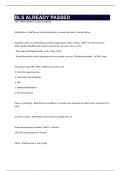
BLS ALREADY PASSED
CAB - circulation, airway, breathing Defibrillation - the use of electrical shock to restore the heart's normal rhythm Situations where not initiating BLS would be appropriate. These include: - - An unsecure scene where performing BLS could result in injury to the rescuers, such as a fire. - Clear signs of biological death, such as rigor mortis. - A valid directive or order indicating not to resuscitate, such as a "Do Not Resuscitate", or DNR, order. one-person adult CPR - 1. Make sure ...
- Package deal
- Exam (elaborations)
- • 2 pages •
CAB - circulation, airway, breathing Defibrillation - the use of electrical shock to restore the heart's normal rhythm Situations where not initiating BLS would be appropriate. These include: - - An unsecure scene where performing BLS could result in injury to the rescuers, such as a fire. - Clear signs of biological death, such as rigor mortis. - A valid directive or order indicating not to resuscitate, such as a "Do Not Resuscitate", or DNR, order. one-person adult CPR - 1. Make sure ...
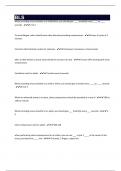
BLS 100% PASSED
When providing rescue breaths to a child/infant, you should give ____ breath(s) every ____ to ____ seconds - 2 to 3 To avoid fatigue, when should team roles alternate providing compressions - every 5 cycles of 2 minutes Common administration routes for naloxone - intranasal, intravenous, intramuscular after an AED delivers a shock, what should the rescuers do next - resume CPR, starting with chest compressions Ventilation rate for adults - I breath every 6 seconds When providing rescue b...
- Package deal
- Exam (elaborations)
- • 3 pages •
When providing rescue breaths to a child/infant, you should give ____ breath(s) every ____ to ____ seconds - 2 to 3 To avoid fatigue, when should team roles alternate providing compressions - every 5 cycles of 2 minutes Common administration routes for naloxone - intranasal, intravenous, intramuscular after an AED delivers a shock, what should the rescuers do next - resume CPR, starting with chest compressions Ventilation rate for adults - I breath every 6 seconds When providing rescue b...
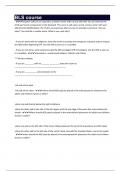
BLS course
- Dispatch calls you to respond to a family's home with a 6 year old child. You are told that the child was found unresponsive in the backyard. This scene is safe upon arrival, and you enter with your AED (monitor/defibrillator). The child is unresponsive after you tap his shoulders and shout "Are you okay?" He could be in cardiac arrest. What is your next step? - if you are alone with no cellphone, leave the victim to activate the emergency response system and get the AED before beginni...
- Package deal
- Exam (elaborations)
- • 5 pages •
- Dispatch calls you to respond to a family's home with a 6 year old child. You are told that the child was found unresponsive in the backyard. This scene is safe upon arrival, and you enter with your AED (monitor/defibrillator). The child is unresponsive after you tap his shoulders and shout "Are you okay?" He could be in cardiac arrest. What is your next step? - if you are alone with no cellphone, leave the victim to activate the emergency response system and get the AED before beginni...
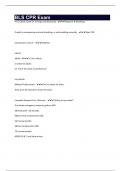
BLS CPR Exam
First, Check victim for 2 things simultaneously - Response & Breathing If adult is unresponsive and not breathing, or not breathing normally, - Start CPR. Compression rate of: - 100/min infants Adults - 1.5 for infants 2 inches for adults (or 1/3 of the chest circumference) Lay people: Medical Professionals: - Do not check for pulse. Only up to 10 seconds to search for pulse. Complete Sequence for 1 Rescuer: - 1)Hey, are you okay? 2) activate emergency response, grab an AED. 3)Check ...
- Package deal
- Exam (elaborations)
- • 4 pages •
First, Check victim for 2 things simultaneously - Response & Breathing If adult is unresponsive and not breathing, or not breathing normally, - Start CPR. Compression rate of: - 100/min infants Adults - 1.5 for infants 2 inches for adults (or 1/3 of the chest circumference) Lay people: Medical Professionals: - Do not check for pulse. Only up to 10 seconds to search for pulse. Complete Sequence for 1 Rescuer: - 1)Hey, are you okay? 2) activate emergency response, grab an AED. 3)Check ...
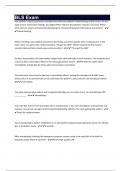
BLS Exam
You perform a rapid assessment and determine that your patient is experiencing cardiac arrest. On the basis of your assessment findings, you begin CPR to improve the patient's chances of survival. Which term refers to clearly and rationally identifying the connection between information and actions? - Critical thinking While orienting a new medical assistant to the facility, you find a patient who is unresponsive in the exam room. You yell to the medical assistant, "Go get the AED!" Whi...
- Package deal
- Exam (elaborations)
- • 5 pages •
You perform a rapid assessment and determine that your patient is experiencing cardiac arrest. On the basis of your assessment findings, you begin CPR to improve the patient's chances of survival. Which term refers to clearly and rationally identifying the connection between information and actions? - Critical thinking While orienting a new medical assistant to the facility, you find a patient who is unresponsive in the exam room. You yell to the medical assistant, "Go get the AED!" Whi...
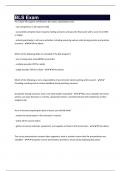
BLS Exam
For a basic life support certificate to be issued, a participant must: - rate competency in all required skills - successfully complete team response testing scenarios and pass the final exam with a score of an 84% or higher - actively participate in all course activities, including assuming various roles during practice and practice scenarios - All the above Which of the following skills are included in the BLS program? - use of a bag-valve-mask (BVM) resuscitator - multiple-provider CP...
- Package deal
- Exam (elaborations)
- • 3 pages •
For a basic life support certificate to be issued, a participant must: - rate competency in all required skills - successfully complete team response testing scenarios and pass the final exam with a score of an 84% or higher - actively participate in all course activities, including assuming various roles during practice and practice scenarios - All the above Which of the following skills are included in the BLS program? - use of a bag-valve-mask (BVM) resuscitator - multiple-provider CP...
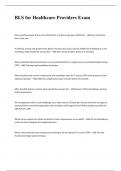
BLS for Healthcare Providers Exam
How would you know that a rescue breath for a victim of any age is effective? – ANS You should see their chest rise. A child has a heart rate greater than 60 per minute and a pulse, but has ineffective breathing or is not breathing, what should the rescuer do? – ANS Give rescue breaths. (every 3-5 seconds) What ventilation device/ technique is not recommended for a single rescuer to provide breaths during CPR? – ANS The bag-mask ventilation technique. What would be the correct compre...
- Package deal
- Exam (elaborations)
- • 3 pages •
How would you know that a rescue breath for a victim of any age is effective? – ANS You should see their chest rise. A child has a heart rate greater than 60 per minute and a pulse, but has ineffective breathing or is not breathing, what should the rescuer do? – ANS Give rescue breaths. (every 3-5 seconds) What ventilation device/ technique is not recommended for a single rescuer to provide breaths during CPR? – ANS The bag-mask ventilation technique. What would be the correct compre...
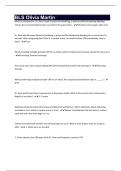
BLS Olivia Martin
Olivia is unresponsive. Dr. Dave needs to assess for breathing, a pulse and life-threatening bleeding. Choose the recommended location to perform the pulse check. - Brachial artery (upper right arm) Dr. Dave should assess Olivia for breathing, a pulse and life-threatening bleeding for no more than 10 seconds. After recognizing that Olivia is in cardiac arrest, he should initiate CPR immediately, true or false? - True When providing multiple-provider CPR for an infant, which compression tech...
- Package deal
- Exam (elaborations)
- • 2 pages •
Olivia is unresponsive. Dr. Dave needs to assess for breathing, a pulse and life-threatening bleeding. Choose the recommended location to perform the pulse check. - Brachial artery (upper right arm) Dr. Dave should assess Olivia for breathing, a pulse and life-threatening bleeding for no more than 10 seconds. After recognizing that Olivia is in cardiac arrest, he should initiate CPR immediately, true or false? - True When providing multiple-provider CPR for an infant, which compression tech...
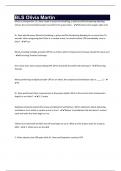
BLS Olivia Martin
Olivia is unresponsive. Dr. Dave needs to assess for breathing, a pulse and life-threatening bleeding. Choose the recommended location to perform the pulse check. - Brachial artery (upper right arm) Dr. Dave should assess Olivia for breathing, a pulse and life-threatening bleeding for no more than 10 seconds. After recognizing that Olivia is in cardiac arrest, he should initiate CPR immediately, true or false? - True When providing multiple-provider CPR for an infant, which compression tech...
- Package deal
- Exam (elaborations)
- • 2 pages •
Olivia is unresponsive. Dr. Dave needs to assess for breathing, a pulse and life-threatening bleeding. Choose the recommended location to perform the pulse check. - Brachial artery (upper right arm) Dr. Dave should assess Olivia for breathing, a pulse and life-threatening bleeding for no more than 10 seconds. After recognizing that Olivia is in cardiac arrest, he should initiate CPR immediately, true or false? - True When providing multiple-provider CPR for an infant, which compression tech...
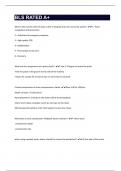
BLS RATED A+
What is the correct order of steps in the in-hospital chain of survival for adults? -1.- Early recognition and prevention 2.- Activation of emergency response 3.- High quality CPR 4.- Defibrillation 5.- Post-cardiac arrest care 6.- Recovery What are the components of a pulse check? --Use 2-3 fingers to locate the pulse -Feel the pulse in the groove to the side of the trachea -Assess for a pulse for at least 5 but no more than 10 seconds Critical components of chest compressions: Adults...
- Package deal
- Exam (elaborations)
- • 11 pages •
What is the correct order of steps in the in-hospital chain of survival for adults? -1.- Early recognition and prevention 2.- Activation of emergency response 3.- High quality CPR 4.- Defibrillation 5.- Post-cardiac arrest care 6.- Recovery What are the components of a pulse check? --Use 2-3 fingers to locate the pulse -Feel the pulse in the groove to the side of the trachea -Assess for a pulse for at least 5 but no more than 10 seconds Critical components of chest compressions: Adults...
